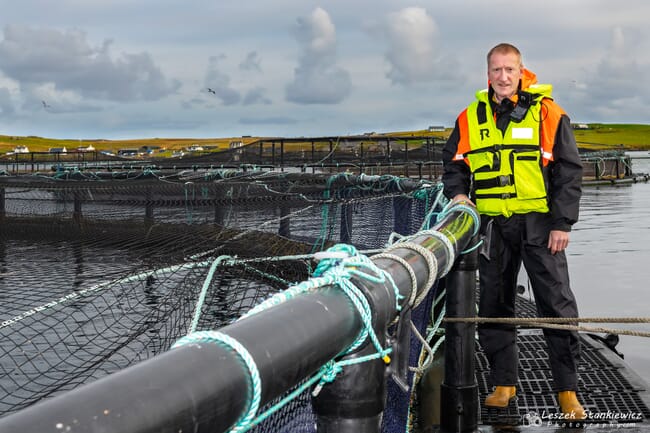
Green jobs and sustainable operations underpin this radical new roadmap for Scottish salmon – the country’s number one food export.
Called A Better Future For Us All, it covers a wide range of farming aspects and features key environmental pledges. These include a commitment to becoming 100 per cent reliant on renewable energy.
The sector has also pledged to purchase all of its feed ingredients from sustainable and fully traceable sources and work towards having 100 per cent recyclable packaging.
It also makes commitments relating to achieving key targets in fish health and welfare, community support, employment and maintaining the highest food quality standards.
There will be a clear new focus on qualifications, careers and a diverse workforce as well as innovation-led development which will secure further progress in tackling some of the key challenges the sector faces.
Tavish Scott, incoming chief executive of the Scottish Salmon Producers Organisation (SSPO), hailed the document as “momentous” and “ground-breaking”.
“We already have an incredibly good environmental story to tell with a low carbon footprint, low freshwater use and great feed conversion rates. But, by publishing this document today, we declare our commitment to go further and meet even more exacting standards in the years to come,” said the former Scottish Lib Dem leader.
“We lead the world in many aspects of farming salmon. We also enjoy a well-deserved global reputation for producing the world’s best salmon. But this document shows our commitment to stay out in front, evolving the way we farm to make sure our environmental and sustainability credentials remain the best in the world,” he added.
Other commitments in the document include:
- Improving pen structures to make sure all fish are prevented from escaping.
- Directing more money and resource into farming communities.
- Installing electric vehicle charging points.
- The sector will establish a salmon experience visitor centre.
- Providing sustainable homes in the communities where the farms are.
- Working with government, regulators and other bodies to establish innovation sites to trial new technology.
- Creating clear career-development paths and focusing on long-term skills and recruitment to provide more high-quality jobs in rural areas.
Atholl Duncan, chair of the SSPO, said: “Scotland’s recovery from the Covid pandemic has to be green, it has to be sustainable and it has to be led by successful global brands. This new vision for the Scottish salmon sector reflects our commitment to meet all those requirements. We can help harness the potential of the blue economy to drive forward the green recovery that Scotland wants to see.”
“Next year marks the 50th anniversary of the first commercially harvested farmed salmon in Scotland. This vision will take us forward into the next 50 years.”
Political support
In a joint statement, Fergus Ewing, the Cabinet Secretary for the Rural Economy and Tourism, and Roseanna Cunningham, the Cabinet Secretary for the Environment, Climate Change and Land Reform, said: “We very much welcome and endorse this vision for the industry; it is bold, ambitious and promotes a sustainable aspiration towards supporting the local communities it serves.
“The industry is a key employer in rural areas and with the impact of Coronavirus (Covid-19) and threats from Brexit, we are pleased that the sector can continue to bring benefits to and nurture these fragile rural areas.
“The sustainable growth of the aquaculture industry is an important part of the blue economy model that we are driving forward; and we welcome the industry’s commitment to continued research and innovation which will enable sustainable growth while maintaining the right balance across Scotland’s economic, environmental and social responsibilities.”




